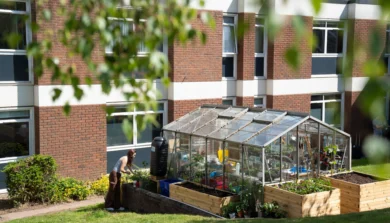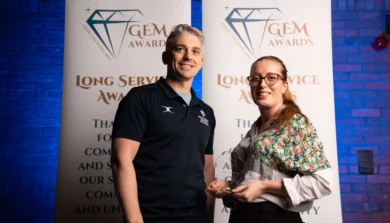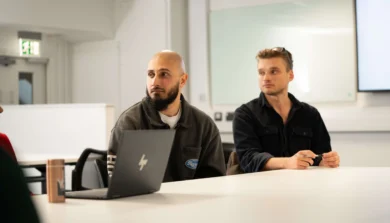MSc Integrative Counselling
Postgraduate
- Start date
- –
- Study mode
- –
- Course length
- –
- UCAS Code
- –

Interested in a different start date?
This course is currently undergoing revalidation and, as such, not accepting new applications.
Discover how integrative counselling can support personal growth, relational depth and professional development. The Postgraduate Diploma / MSc Integrative Counselling at Birmingham Newman University offers a reflective and practice-based route into the counselling profession. Grounded in relational and person-centred values, the course introduces two core therapeutic approaches: Gestalt and Psychodynamic. You will be supported in developing a flexible and responsive framework that meets the needs of diverse clients. The programme combines academic learning, clinical experience and personal development within a collaborative and inclusive environment.
Why Study This Course?
Studying the Postgraduate Diploma / MSc Integrative Counselling at Birmingham Newman University offers more than professional training. It provides space to explore your development as a practitioner while deepening your understanding of therapeutic work in a reflective and inclusive environment. The course is suited to those ready to engage with the emotional, relational and psychological dimensions of counselling, and who want to build a practice that is both grounded and responsive. Whether you are entering the profession or formalising existing experience, this programme encourages personal growth alongside professional learning.
Explore the Foundations of Integrative Counselling
Integrative counselling draws on empathy, relational depth and psychological insight, and this course helps you understand how these principles apply in real-world settings. You will be introduced to Gestalt and Psychodynamic approaches and supported in developing a coherent framework that reflects your values and meets the needs of diverse clients. Topics include the counselling relationship, mental health, social context and the integration of theory into practice. These areas are explored through clinical placement, personal therapy and regular supervision, helping you reflect on your work and grow as a practitioner.
Supportive and Personalised Learning
At Birmingham Newman, you will be part of a learning community that values integrity, reflection and relational practice. The course is delivered by experienced counsellors and educators who offer individualised support throughout your training. With a strong emphasis on supervision, collaboration and self-awareness, the programme creates a safe and encouraging space in which to develop your skills. Whether your aim is professional registration, private practice or further academic study, you will be supported in becoming a thoughtful, capable and confident practitioner.
Counselling, Psychotherapy & Talking Therapies Team
– Faisal Mahmood (Head of Subject (Counselling, Psychotherapy & Talking Therapies)
– Joanne Adams (Lecturer / Placement Manager)
– Kathryn Broome (Lecturer / Programme lead Introductory Cert Counselling)
– Stephanie Carr (Lecturer)
– Emily Evans (Senior Lecturer / Joint Programme lead FD)
– Carl Flynn (Senior Lecturer / Programme lead PWP)
– Sam Gallo (Senior Lecturer / Programme lead MSc Integrative Counselling)
– Kiran Kalsi (Lecturer)
– Karen Lee (Senior Lecturer)
– Linda Luckhurst (Senior Lecturer / Programme lead Advanced Diploma Psychotherapy)
– Awisha Magar (Lecturer)
– Bill Naylor (Senior Lecturer / Programme lead Counselling, MH & Wellbeing)
– Steve Roberts (Senior Lecturer / Joint Programme lead FD)
– Cassie Rowland (Lecturer)
– James Sedgwick (Senior Lecturer / Programme lead MSc in Integrative Psychotherapy)
– Rebekah Woodhouse (Senior Lecturer / Programme lead Joint Honours and Top Up)
– Sandra Boden – Senior Lecturer

Got a question you’d like to ask?
Entry requirements
We welcome students from all backgrounds and accept a wide range of qualifications. If yours aren’t listed, don’t worry – our Admissions Team can help you explore your options. See full entry requirements.
You must have a 1st degree in any subject (minimum 2:2 or equivalent) and level 3 or 4 certificate in counselling skills with experience of having used skills in a workplace or voluntary setting. Successful admission onto the programme is also dependent upon demonstrating your suitability to undertake clinical training at interview. It may be possible in some cases for you to enter the programme without the Level 3 certificate where you can demonstrate in the application that you have acquired the specific competencies outlined in the BACP Counselling Skills Competency Framework either through an equivalent training programme or though practical experience in a voluntary or workplace setting.
Applicants will normally be invited to a selection day for a group task and individual interview.
If English is not your first language, you must have an IELTS score of 6.5, with no element below 6.0. (Other English language qualifications are also accepted. Please contact admissions for further information).
Consideration will be given to applicants with lower grade in qualifications (e.g. a 3rd class degree or non-honours degree) who have a relevant range of post study professional experience. Professional experience will be considered by the programme leader in conjunction with the quality office on an individual basis.
Non-Academic Requirements:
DBS Clearance. Candidates must receive a satisfactory Disclosure and Barring System check prior to commencing the course.
Please contact Admissions if you have any questions.
Course fees
The tuition fee for academic year 2026/27 is: £11,300. Tuition fees for courses starting April to May 2026, fall within the 2025/26 academic cycle.
Fees for the 2025/26 academic year can be found on our Student Finance pages.
Additional costs
The University will review tuition fees and increase fees in line with any inflationary uplift as determined by the UK Government, if permitted by law or government policy, in subsequent years of your course. It is anticipated that such increases would be linked to RPI (the Retail Price Index excluding mortgage interest payments).
Check out our blog/news/events

Birmingham Newman Celebrates Green Week 2026 with Campus‑Wide Events
Birmingham Newman will host its annual Green Week from 23 to 27 February 2026, bringing…

Research that makes a difference: Mark Holland wins Most Impactful Project Award
In December, we held our Staff Awards, where we recognised the outstanding achievements of colleagues…

Sports Coaching students Deliver Coaching Sessions for Local Primary Pupils
Birmingham Newman University recently welcomed pupils from St Peter’s Primary School to campus as part…

Vice-Chancellor Professor Jackie Dunne awarded MBE in New Year Honours
Vice-Chancellor of Birmingham Newman University receives an MBE for services to Higher Education.

Birmingham Newman University Celebrates Staff Achievements at Annual Awards
Birmingham Newman University celebrates its staff at the Annual Staff Awards Celebration.

Book an open day
Find out about our next open day. Book now to secure your place.
Placement Information
Throughout your MSc Integrative Counselling course, you will engage with supervised clinical placements across the West Midlands and surrounding areas. These experiences are carefully integrated with your academic modules to support your development as a practitioner. You will be guided by experienced professionals and supported by university staff, with progress monitored through structured reflection and supervision. You will also work directly with clients in approved settings, helping you to build insight, confidence and a deeper understanding of relational practice. These opportunities are designed to help you apply theory to real-life scenarios and grow into a capable and reflective counsellor.

Where this course can take you. This course supports your development as a reflective and capable practitioner. It encourages self-awareness, critical thinking and the formation of a strong professional identity. Whether you are preparing for independent practice, working in public or voluntary services or planning further academic study, you will graduate with the knowledge, values and tools needed to contribute to the field of counselling. The programme is designed to help you grow into a confident and responsive professional, ready to meet the needs of diverse communities.
Accreditations and Exemptions
The course follows the British Association for Counselling and Psychotherapy (BACP) Ethical Framework and includes training in online and telephone counselling in line with BACP guidance. We have full BACP accreditation. Upon successful completion, you will gain registration with the BACP. The programme is designed to prepare you for professional practice, offering the knowledge, skills and reflective grounding needed to work independently or within a range of counselling settings.
Courses we think you'll also like

Counselling, Mental Health and Wellbeing (with Foundation Year) BA (Hons)
- Start date:
- September 2026

BA Counselling Studies and Working with Children, Young People and Families
- Start date:
- September 2026

BA Counselling Studies and Working with Children, Young People and Families (with Foundation Year)
- Start date:
- September 2026

BA Counselling Studies and Working with Children, Young People and Families
- Start date:
- September 2026
